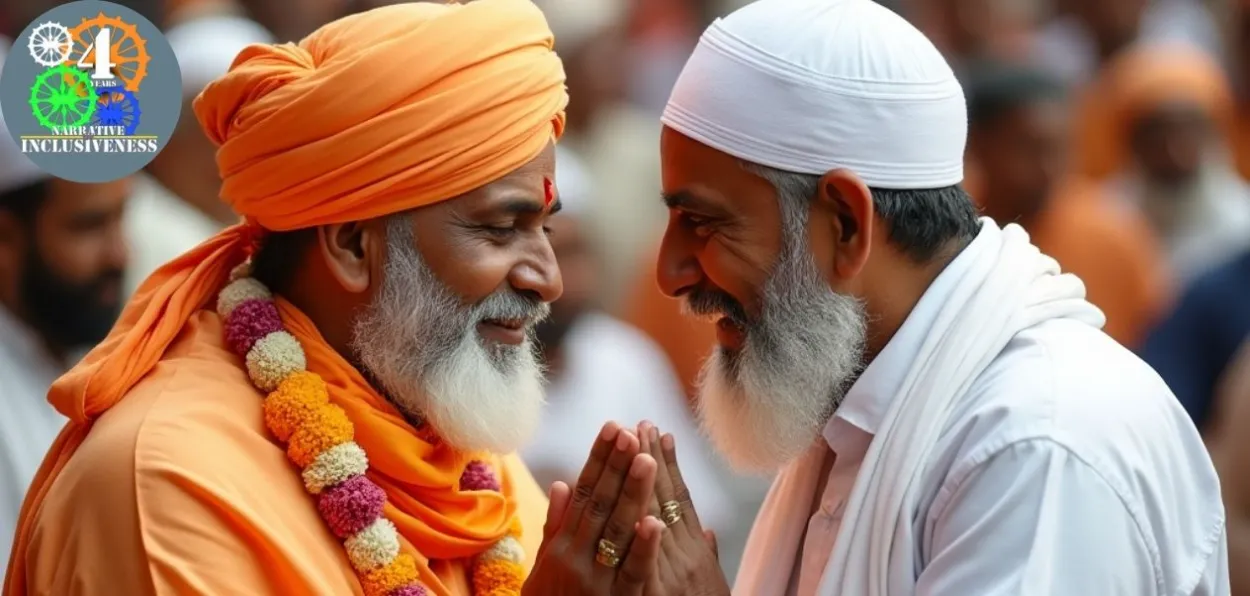
 Dear Readers,
Dear Readers,
We are thankful for your patronage. Your support has helped us attain readership in India and abroad.
On our fourth anniversary, we reflect on the challenges in fostering inclusive journalism, especially in an era where even simple inter-faith conversations are taboo.
From Editor's Desk
Our regular readers know that our approach is not reactionary; rather we believe in journalism of deep thinking and research.
Our growing readership and the fact that people from different communities are approaching us to share their points of view on sensitive issues shows we are touching the right chords.
Our content has accommodated both the aspirations of the majority Hindu community and the challenges faced by Indian Muslims, addressing issues such as Islamophobia and the feeling of victimhood that some may experience.
At a time when communities are increasingly retreating into shells amid growing mistrust and skepticism, Awaz offers space for discourse on co-existence. This is our biggest achievement.
Our thought-provoking content promoting dialogue, inclusiveness and uplifting Indian Muslim youth, and empowering women empowerment is effective.
Other media organizations notice and follow up on our stories and content.
Awaz has emerged as a repository of information on Indian Muslims and it's useful for researchers.
We’ve never shied away from calling a spade a spade, and this uncompromising approach has earned us a reputation as a dignified media organization.
We, at Awaz, strive for objectivity, especially while dealing with the current political and social environment in India.
A distinctive aspect of Awaz has been our commitment to highlighting positive thought leaders from diverse communities who bring varied perspectives and insights into our shared history and help improve our understanding of religions.
We touched upon sensitive topics such as Ijtihad (independent or original interpretation of problems not precisely covered by the Quran, Hadith, and Ijma). As a result of this progressive narrative, today, Ijtihad is discussed in Indian Muslim households and institutions to find solutions to tricky issues.
Our sincerity has resonated with all sections of Indian society; it has won us the confidence of all.
Besides conducting dialogue between Hindus and Muslims, we have also given space to people from other faiths to showcase India's diversity.
We have engaged with major Indian Muslim institutions imparting Islamic studies and modern education. Students from many such institutions are doing internships at Awaz-The Voice.
Our view is that the rise of ‘Hindutva’ is a reality, just as the presence of more than 20 crore Indian Muslims is. Both these realities must be respected and converged into a discourse of peaceful living. The responsibility for improving Hindu-Muslim relations cannot fall on one community alone.
It is essential to recognize that past experiences of ‘secularism’ have not granted Indian Muslims special privileges. To many, it represents a means to live in peace and dignity. The notion of Muslim appeasement has been politicized and fails to reflect reality.
The belief that Hindus have the "first right" over India has grown stronger and is likely to endure, regardless of which political party is in power.
With changing political realities and national mood, a fresh understanding between Indian Hindus and Muslims is imperative. We must create an environment conducive to dialogue on contentious issues.
The good news is that this conversation is already underway, especially within the Muslim community, which has grown disillusioned with the ‘secular’ narrative.
It may be recalled that Indian Muslims never campaigned for an explicitly secular state at the time of Independence. Nor did the majority of them support the partition of India or the creation of Pakistan on religious grounds.
The desire of a small minority of Muslims to create a separate nation should not be misconstrued as a collective Muslim referendum.
Indian Muslims remained in India because this was their ancestral land.
Even before the word ‘secularism’ was introduced in the Constitution, Hindus and Muslims lived harmoniously for centuries. The strong foundation of this coexistence provides hope for those who may feel disillusioned by the current state of affairs.
To appreciate and adapt to the new reality of India, the Muslim community must prioritize reforms in education, employment, and women empowerment.
Traditionally, Indian Muslims have largely followed the media, which has only focused on the community’s politics and ignored other important facets of their life, including their success stories and issues of everyday life.
Awaz has generated content from a different angle to improve the state of Muslims and their integration into the mainstream.
In the past four years, we have organized discussions with experts and community members to create awareness about the rights and duties of Indian Muslims.
We focus on social reforms and creating awareness about employment opportunities and entrepreneurship.
We have been at the forefront of pushing for reforms within Indian Muslim society, suggesting pathways to appreciate the essence of Islam and laying out a vision for a brighter future for our country.
Only Muslims can improve their status and overcome the feeling of victimhood. Indian Muslims must become self-reliant and progressive, much like Muslims in other countries.
As a media organization, we are committed to creating good content for Hindu-Muslim dialogue and uplifting Indian Muslims. We firmly believe that rhetorical and ill-informed debates and the ostrich-like mentality on key issues will not do us any good.
We require meaningful dialogue, both within the Muslim community and with the Hindus to move forward.
The positive feedback from readers/viewers through emails and comments is encouraging and drives our teams to work harder.
Our nation stands at the cusp of transformation and is poised to become a global power. For this to become a reality, all Indian communities must contribute towards a discourse of peace.
Yours' Truely,
Atir Khan
Editor-in-Chief, Awaz the Voice
